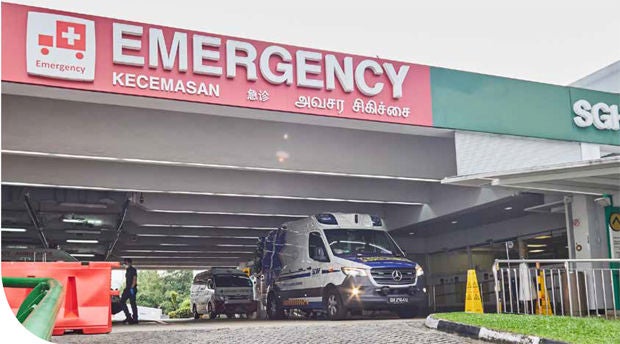
From national disasters to road accidents, severe infections and illnesses, the department resuscitates, stabilises and treats emergency cases round the clock.
 1 - Arrival
1 - Arrival
Patient arrives by ambulance, or public or private transport.
COVID-19 screening when needed
Temperature is taken and patient declares any acute respiratory infection symptoms or risk of COVID-19.
High-risk patients take Antigen Rapid Test (ART) and Polymerase Chain Reaction (PCR) tests.
 2 - Triage
2 - Triage
Patients are grouped by urgency of condition, and electrocardiogram (ECG), testing of vital signs and painkillers are given if needed.
How are patients categorised?
P1: emergency cases
Common causes: heart attacks, major road traffic accidents,
serious burns, respiratory collapse
• Usually transported by Singapore Civil Defence Force (SCDF) ambulances, whose paramedics message the emergency department details ahead of arrival
• Patients who are unable to provide travel and medical history will undergo ART and PCR tests
• Life-saving treatment is given, using emergency equipment such as the mechanical cardiopulmonary resuscitation (CPR) device, ventilator, defribrillator, and cardiac monitor
P2: critical care cases
Common causes: asthma or other respiratory problems, mild chest pain or discomfort, falls with multiple injuries
• Patients are given immediate care at the critical care area by senior doctors
• Those with acute respiratory symptoms are sent to the isolation area, where they receive immediate treatment before undergoing ART and PCR tests
P3 and P4: walk-in cases and patients who do not require A&E care
Common causes: sprained ankles, diarrhoea, vomiting, gastroenteritis
• After self-registration, patients wait between 30 minutes to three hours for consultation. Those with severe abdominal or chest pain are seen urgently
• If obstetrics and gynaecology (O&G), ear, nose and throat (ENT), eye or dental specialists need to be called in, patients can expect an additional one-to four-hour wait
 3 - Treatment
3 - Treatment
Patients are seen by a team of senior emergency medicine specialists, supported by medical officers and residents, who call in specialists from other departments, or are sent to other wards or centres for specialist treatment, where necessary.
Discharge
After consultation, patients are discharged with instructions
on home care, and a follow-up appointment is scheduled if required.
If blood tests, x-ray or other imaging scans are done, patients wait
for results and see their specialists again for review.
Patients who require admission undergo ART and PCR tests, and their next of kin is informed.
 4 - Medication
4 - Medication
Patients collect medicine, if any, from the pharmacy.
5 - Payment
Patients make payment online.
Facts and Figures |
*During the COVID-19 pandemic, as many as 80 patients |
are the minimum number of medical professionals running the department, including the resuscitation panels, critical care, |
are available for critical emergency cases, such as road traffic |
is the average time each patient spends at the DEM. |
$128is the basic attendance fee, including some basic tests and medications and after government subsidy, for patients who are not admitted for further investigations. |
Round-the-clock emergencies
SGH’s emergency department offers round-the-clock emergency care, including heart attacks and other acute heart conditions, pneumonia, acute asthma, stroke, toxic ingestions and major injuries. Patients are managed in a six-bedded critical care area.
SGH is one of four hospitals in Singapore that is able to provide intravenous thrombolysis for ischaemic stroke, and one of three providing endovascular clot retrieval. An average of five stroke patients are transferred from other hospitals within the SingHealth cluster to SGH each week for major resuscitation.













 Get it on Google Play
Get it on Google Play